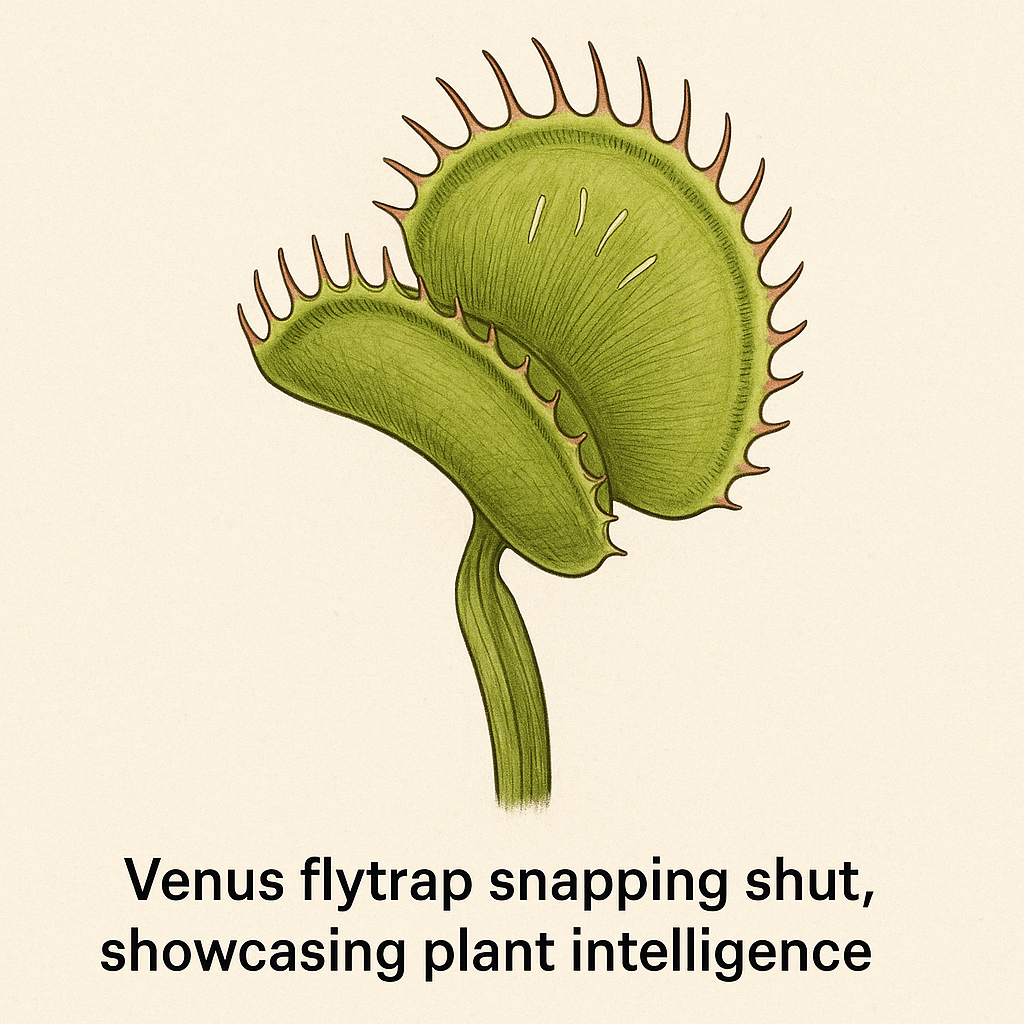The Fascinating Science of Plant Intelligence: How Plants Think and Adapt
What if the plants in your garden were quietly thinking, learning, and even communicating? It sounds like science fiction, but cutting-edge research reveals that they are far more than passive greenery. From electrical signals zipping through their tissues to roots navigating obstacles like tiny self-driving systems, plant intelligence is redefining our understanding of life. Whether you’re a vegan, a gardener, or just nature-curious, this article dives into how they process their world—and what it means for us. You’ll discover mind-blowing studies, practical takeaways, and a fresh perspective on the broccoli on your plate. Let’s dig into the “brainy” world of leaves and roots!
Table of contents
- The Fascinating Science of Plant Intelligence: How Plants Think and Adapt
- The “Brainy” World of Leaves and Roots
- Venus Flytraps: Nature’s Quick Thinkers
- Roots as Distributed Brains
- Learned Behaviors: Are Plants Studying Us?
- Pain or No Pain? The Ethical Debate
- Indigenous Wisdom Meets Modern Science
- Implications for Vegans and Plant-Based Living
- FAQ: Common Questions About Plant Intelligence
- Conclusion on Plant Intelligence
- Reclaim Your Health & Vitality with EudaLife Magazine
The “Brainy” World of Leaves and Roots
Plants might not have brains, but they’re wired for action. Scientists have detected electrical signals—called action potentials—traveling through tissues, eerily similar to nerve impulses in animals. A study from Linköping University found these signals help plants respond to threats like pests in real time.
Venus Flytraps: Nature’s Quick Thinkers
Take the Venus flytrap: it snaps shut only after two touches within 30 seconds. This “double-check” system prevents wasted energy on false alarms, showcasing a primitive decision-making process. Researchers noted that anesthetics can halt this snap, mimicking animal sedation.

Roots as Distributed Brains
Even more astonishing, a plant’s root tip acts like a “distributed brain.” Studies show roots sense obstacles and reroute growth, adapting like a self-driving car navigating soil. This unique angle suggests that they process their environment in ways we’re only beginning to understand
Learned Behaviors: Are Plants Studying Us?
They don’t just react—they learn. In a famous 2016 experiment revisited in 2024, Mimosa pudica plants stopped folding their leaves after repeated harmless drops, “realizing” the action wasn’t a threat. Weeks later, they still remembered, hinting at a form of memory.
Pavlov’s Peas
Pea plants take it further. A study showed they grew toward a fan associated with light, mimicking Pavlovian conditioning. While some scientists debate these findings, the evidence points to them retaining and acting on information—traits we once thought were exclusive to animals.
Why It Matters
This adaptability challenges our view of intelligence. They might not ace a math test, but their ability to “study” their surroundings offers a survival edge—and a fascinating glimpse into nature’s complexity.
Pain or No Pain? The Ethical Debate
Do they feel pain? It’s a hot topic with no clear answer. Lacking brains or nerves, they don’t suffer like mammals, says mainstream science. Yet, anesthetics like ether can “knock out” a Venus flytrap, halting its snap—mimicking animal sedation.
Distributed Consciousness?
Some researchers propose a “distributed consciousness”—not centralized like ours, but a subtle awareness woven through their systems. While controversial, this idea sparks ethical questions about how we treat them. For now, the case remains open, urging us to rethink our assumptions.
A Balanced View
Even if plants don’t “feel,” their responsiveness invites respect. It’s less about guilt and more about appreciating the intricate life in every leaf.
Indigenous Wisdom Meets Modern Science
Long before labs, Indigenous cultures saw them as thinking relatives. Shamans describe plants like ayahuasca as “teachers,” suggesting they share knowledge. Modern science echoes this through findings like electrical signaling and plant memory, which align with ancient views of “talking trees.”
Bridging Worlds
Research into plant consciousness highlights their adaptive behaviors, challenging traditional views of intelligence. While Indigenous perspectives on them as sentient beings resonate with these findings, further research is needed to fully bridge cultural and scientific insights.
Implications for Vegans and Plant-Based Living
If plants are “smart,” does veganism lose its ethical edge? Not quite. Experts argue that even with awareness, plants lack the complex suffering of animals. Still, it’s worth reflecting on our food choices.
Mindful Eating Checklist
- Reduce Waste: Use the whole plant—stems, leaves, and all.
- Diversify: Avoid monoculture staples; try varied, eco-friendly crops.
- Source Ethically: Support regenerative farms over chemical-heavy ones.
- Connect: Grow herbs or visit gardens to deepen your plant bond.
A Deeper Respect
Being mindful doesn’t mean abandoning veggies. It’s about honoring the life cycle—plant or animal—that sustains us, a core value at EudaLife.
Table: Plant vs. Animal Awareness
| Feature | Plants | Animals |
| Nervous System | No | Yes |
| Memory | Yes (basic) | Yes (complex) |
| Pain Response | Unclear | Yes |
| Adaptive Behavior | Yes | Yes |
FAQ: Common Questions About Plant Intelligence
FAQ: Common Questions About Plant Intelligence
No, plants lack brains, but they process information via electrical signals and memory, showing a unique form of intelligence.
Science says no—they don’t have nerves. However, they do react to damage, sparking ethical debates.
Through chemical and electrical responses, plants adapt to repeated stimuli, retaining “lessons” over time.
Not really. Plants don’t suffer like animals, but mindful harvesting can deepen respect for all life.
Conclusion on Plant Intelligence
Plant intelligence flips the script on nature: from passive greenery to active, adaptive lifeforms. With electrical signals, memory, and root “brains,” like the Venus flytrap and Mimosa pudica reveal a hidden world of awareness. At EudaLife, we see this as a call to value every bite—whether it’s spinach or steak—with gratitude. Try growing a herb, cutting waste, or exploring local farms to connect with this wonder. Curious for more? Dive into 2025’s research or share this with a friend. Nature’s story is just beginning—let’s keep listening!
Reclaim Your Health & Vitality with EudaLife Magazine
Welcome to EudaLife Magazine, your trusted source for reclaiming health, vitality, and peak performance in the modern world. Blending ancient wisdom with cutting-edge science, we deliver expert-backed insights on wellness, longevity, biohacking, mental resilience, and holistic living. Get your copy of our inaugural issue today to support unfiltered health information, small businesses, and American publishing.
